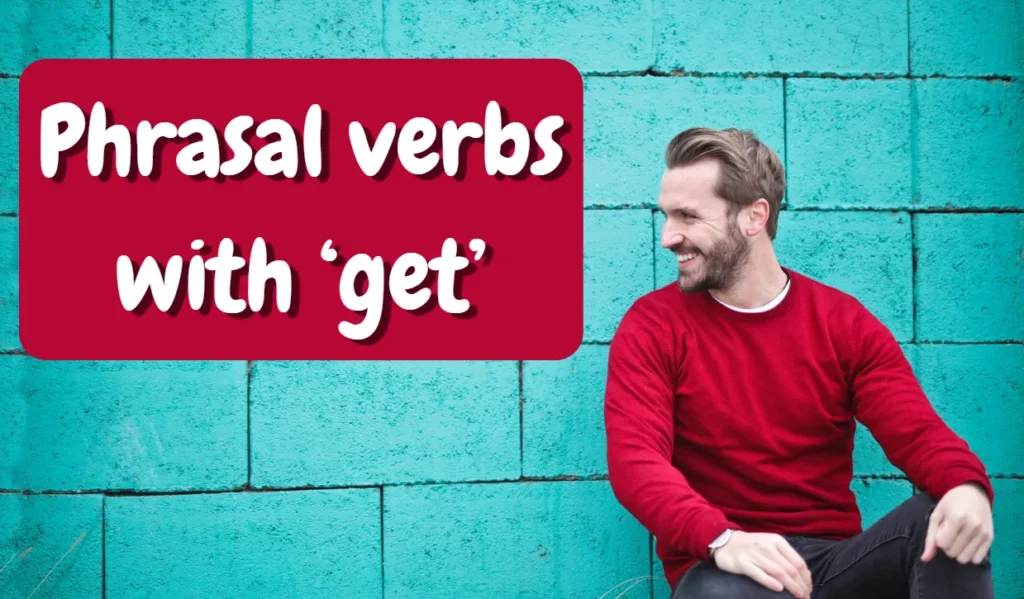Discover the power of English with phrasal verbs using ‘get’! These little phrases can make your English sound natural and full of life.
In this post, I’ll show you some of the most common ways to use ‘get’ in everyday situations – whether it’s to ‘get by’, ‘get over’ something, or even ‘get away’ for a while.
Ready to boost your English? Let’s get started!
What is a phrasal verb?
A phrasal verb combines:
- a verb
- and a particle (or sometimes two particles).
A particle can be a preposition or an adverb, or both. Examples: in, for, through, up, over.
The particle often changes the meaning of the verb.
For example, look means ‘use your eyes and see’ but one meaning of look up is ‘find information in a dictionary, on a website etc’. Phrasal verbs can also have many meanings.
Why are phrasal verbs with 'get' useful?
Phrasal verbs with ‘get’ are useful because they are extremely common. One count suggests there are 177 phrasal verbs with ‘get’! And they’re used in all kinds of different contexts. But don’t worry – I’m here to help you! Let’s learn some common ones and some high-level ones, too.
Relationships

Here are some phrasal verbs with ‘get’ related to people and relationships. Learning them in groups like this will help you remember them.
get in with
Definition: become friendly or popular with somebody, especially in order to gain an advantage
Example: He’s trying to get in with the bosses but I don’t think they like him very much.
get on (with)
Definition: have a good relationship (with)
Example: I don’t get on with my flatmate. He’s too loud and obnoxious.
get round
Definition: persuade someone of something using your charm
Example: I can always get round my dad. You’ll see, he’ll let me go to the party.
get over
Definition: return to your usual state of happiness after breaking up with someone
Example: She was finally getting over him but then he called her!
get at
Definition: criticise a person repeatedly
Example: He’s always getting at me. Why can’t he leave me alone? I haven’t done anything wrong.
More than one meaning
Remember! Phrasal verbs can have more than one meaning, and some have many meanings.
For example, ‘get at’ can mean ‘criticise’, as we saw above.
But it can also mean ‘try to express’ (‘What are you getting at?’ = ‘What are you trying to say?’)
And it can mean ‘reach’ – for example, ‘I can’t get at that jar – it’s too high up on the shelf.’
Jobs and studies

Have a look at these ‘get’ phrasal verbs, all connected to work and studying.
get ahead
Definition: achieve success and make progress in your career
Example: He wants to get ahead so he works overtime and goes to all the meetings.
get off
Definition: finish work for the day
Example: What time do you get off?
get behind
Definition: fail to make progress
Example: I’m getting behind with my studies. I can’t come out tonight.
get on with
Definition: continue working or studying, especially after an interruption
Example: ‘Get on with your work!’ said the teacher.
get by
Definition: be able to live but with difficulty because you don’t have much money
Example: How do you get by on such a small salary?
Transport

Study these examples of phrasal verbs connected to travel and transport.
get in
Definition: arrive (especially for public transport)
Example: What time does your train get in?
get around
Definition: move from place to place
Example: You’re going to Italy? Lovely. How are you going to get around? Have you rented a car?
get off
Definition: leave a mode of transportation
Example: I’m getting off here. See you!
get away
Definition: go somewhere on holiday, often because you need rest
Example: I just need to get away for a few days. Work has been so busy!
Arrangements

Here are phrasal verbs with ‘get’ to talk about arrangements and activities.
get out of
Definition: avoid having to do something you don’t want to do
Example: I told her I’d go. I can’t get out of it now, sadly.
get together
Definition: meet each other
Example: Let’s get together soon. I miss you!
get up to
Definition: do something, have plans
Example: What are you getting up to this weekend?
get back to
Definition: respond when you know the answer
Example: I don’t know if I can come. I might have a seminar that day. I’ll get back to you.
Alternatives to phrasal verbs
You can often replace a phrasal verb with an alternative word or words. But remember, these alternatives are usually more formal. Native speakers tend to use the phrasal verb instead in conversation and informal writing.
Examples
get together – alternative: meet (meet someone)
get off – alternative: alight from (alight from the train)
get by – alternative: survive financially
Learn English in context
The best way to improve your vocabulary is to learn words and phrases in context.
Reading stories is a great way to achieve this! And it’s fun because the stories are exciting.
I adapt stories to different levels of English, from A1+ (Elementary) to B2 (Upper intermediate).
Click below to see the books and choose one that’s perfect for you!









